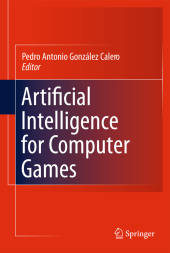 Neuerscheinungen 2014Stand: 2020-02-01 |
Schnellsuche
ISBN/Stichwort/Autor
|
Herderstraße 10
10625 Berlin
Tel.: 030 315 714 16
Fax 030 315 714 14
info@buchspektrum.de |

Marco Antonio Gómez-Martín, Marco Gonzalo
(Beteiligte)
Artificial Intelligence for Computer Games
Herausgegeben von Gonzalo, Marco; Gómez-Martín, Marco Antonio
2011. 2014. xii, 200 S. 235 mm
Verlag/Jahr: SPRINGER, BERLIN; SPRINGER NEW YORK; SPRINGER 2014
ISBN: 1-493-90053-6 (1493900536)
Neue ISBN: 978-1-493-90053-4 (9781493900534)
Preis und Lieferzeit: Bitte klicken
This reviews the integration of current academic AI techniques into electronic entertainment games, including pathfinding, decision making, learning complex behavior, and the latest real-time search methods, all aimed at closer interaction with the player.
The book presents some of the most relevant results from academia in the area of Artificial Intelligence for games. It emphasizes well theoretically supported work supported by developed prototypes, which should lead into integration of
academic AI techniques into current electronic entertainment games.
The book elaborates on the main results produced in Academia within the last 10 years regarding all aspects of Artificial Intelligence for games, including pathfinding, decision making, and learning. A general theme of the book is the
coverage of techniques for facilitating the construction of flexible not prescripted AI for agents in games.
Regarding pathfinding, the book includes new techniques for implementing real-time search methods that improve the results obtained through AI, as well as techniques for learning pathfinding behavior by observing actual players.
Regarding decision making, the book describes new techniques for authoring tools that facilitate the construction by game designers (typically nonprogrammers) of behavior controlling software, by reusing patterns or actual
cases of past behavior. Additionally, the book will cover a number of approaches proposed for extending the essentially pre-scripted nature of current commercial videogames AI into a more interactive form of narrative, where the story emerges from the interaction with the player. Some of those approaches
rely on a layered architecture for the character AI, including beliefs, intentions and emotions, taking ideas from research on agent systems.
The book also includes chapters on techniques for automatically or semiautomatically learning complex behavior from recorded traces of human or automatic players using different combinations of reinforcement learning, case-based reasoning, neural networks and genetic algorithms.
Visual Data Mining of Player Traces in Interactive Environments.- Heuristic search methods for pathfinding.- Pattern-based AI Scripting.- Case-Based Reasoning and User-Generated Gameplay.- Knowledge acquisition for adaptive
game AI.- Game AI as Storytelling.- Affective Interactive Narrative.- Virtual Humans.- Interactive Drama.- Dynamic Behaviour Trees.


